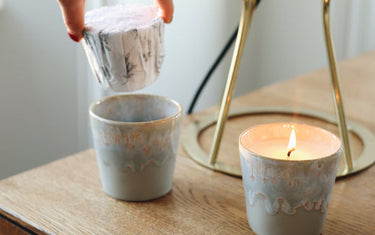5 min read / 2 August 2023 / Laura Garvin Gomez
Jojoba Oil for Hair: Benefits and How to Use
Unlock the secrets of Jojoba Oil for hair - Discover its benefits and learn how to use it effectively in our blog!

If you want to grow nourished, healthy hair without relying on chemical-based products, then it could be time to learn more about the benefits of jojoba oil in hair and scalp treatments.
Not only does it contain plenty of vitamins and minerals, but it offers plenty of flexibility when it comes to application, and it also does not need to be diluted.
In this article, we explain how jojoba oil can help your hair and scalp, the application methods to use and more, helping you get more from your hair care routine.
What is jojoba oil?Jojoba oil is sourced from the seeds of the jojoba plant, which is found in Arizona, Mexico and Southern California. Compared to other carrier oils it is rather unique, as it is more of a wax-like ester and is similar in texture to the sebum produced by our skin. That makes it ideal for moisturising your scalp and hair, helping to reduce hair loss and dry skin. Jojoba oil is packed with vitamins B, E and C and contains zinc and copper – all of which can benefit your hair. |

Benefits of jojoba oil for hair
There are several benefits of jojoba oil in hair you can enjoy with regular application, such as:
1. It maintains the natural balance of your scalp
The antimicrobial and antioxidant properties contained in jojoba oil can help to maintain the pH balance of your scalp and restore its natural moisture levels. By moisturising your hair, it allows your scalp to produce the right amount of oil without creating too much grease.
2. It combats dandruff
By helping to maintain the natural pH levels of your scalp, jojoba oil controls the amount of sebum oil produced which can lower the risk of dandruff occurring. You can use jojoba oil as a pre-shampoo treatment or as a leave-in conditioner once you have finished bathing.
3. It repairs damage caused by styling and heat tools
Hair damage can be caused by overexposure to heat tools and chemical-based treatments. Jojoba offers a great counterpoint, creating a protective barrier that combats heat damage.
When you have finished curling or straightening your hair, apply some oil to your hair to prevent your hair from breaking due to overheating.
4. It promotes growth and thicker hair
The vitamins contained in jojoba oil are a great help when it comes to promoting hair health. The oil is rich in vitamins B, C and E and contains copper and zinc, which can nourish your hair and help it to grow thicker and stronger. A study focused on peppermint oil also tested jojoba oil for hair growth and recorded positive results.
5. It moisturises your hair
The moisturising properties of jojoba oil make it ideal for healing and nourishing your hair. The oil contains oleic and behenic acids that work to strengthen the follicle roots, which in-turn help to maintain the oil balance of your scalp. And if you suffer from itchy scalp, jojoba oil is great at soothing conditions like psoriasis and eczema.
6. It can stop premature greying
When hair is overexposed to stress, dust and pollution it can prematurely start to turn grey. Once applied, it forms a protective barrier to shield the follicles and roots against these types of pollutants and irritants.
The copper contained in jojoba oil (a lack of which in your body can also lead to the greying of hair) can help restore you back to your natural level.

How to use jojoba oil for hair
Here are a few different ways you can safely apply jojoba oil to your hair:
- Massage into the scalp: Because jojoba oil is a carrier oil, you do not have to worry about diluting it before application. So, you can pour a small amount into the palm of your hand and massage it directly into your hair or scalp. Heating the oil can help it to absorb into your scalp or hair a little easier – leave it on for 25-30 minutes before washing out as normal.
- Mix with a commercial hair product: Jojoba oil can be easily integrated with your regular hair care routine by simply adding a few drops to your preferred product. You can also mix the oil with essential oils like rosemary oil or lavender oil for added benefit before application, or alternately, blending it with a shampoo or conditioner and using as normal.
- Create a hair mask: Most hair masks require a carrier oil, and jojoba is often the preferred choice for those looking to create a homemade natural version. It will help to moisturise and nourish dry hair and can also work to restore some of its natural shine and vigour.
- Use it as a sealant: Before you wash your hair, apply a few drops of jojoba oil to your palm and massage it in with your fingertips, before letting it absorb for a few minutes. During application, be sure to massage from the root to the top, as this helps to build a barrier as you shampoo, locking in the natural moisture.
How often can you use jojoba oil for your hair?
It is a good idea to limit how many times you apply jojoba oil to your hair and scalp. Once or twice a week should be enough to see some results after a few weeks. This is especially true if you are blending jojoba with essential oils, as they are highly concentrated and can cause damage to your hair and skin if overused or diluted incorrectly.

Jojoba oil has a lot to offer to your hair and scalp, adding moisture, boosting growth, easing dry scalp conditions and restoring the natural pH levels of your scalp. It can be applied in a variety of ways and also mixed with essential oils, further increasing the natural vitamins and nutrients your hair is exposed to. Very few people ever experience an allergic reaction to using the oil, but if it is your first time, or if you are unsure, we advise that you complete a patch test before applying it to your hair.









